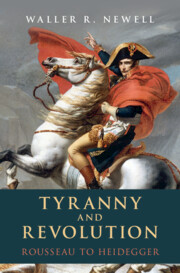‘This is the best study we have of the problems and paradoxes of the German philosophy of freedom, from Rousseau to Heidegger. Newell is a master communicator of deep and complex ideas. His readings bring clarity and coherence to notoriously difficult works. Newell's book stands as an admirable companion and update of Karl Lowith's classic study From Hegel to Nietzsche.'
Steven B. Smith - Yale University
‘Utterly profound and urgently immediate. It shows how and why our major political attempts to find a life that is more communal, noble, free, meaningful and dignified than the pursuit of mere material self-interest have led, paradoxically, not to more freedom, connection, and dignity, but to powerful extremist longings which emboldened revolutionary tyrannies to practice utopian genocide and terror, to build slave states and to crush freedom and the soul, and how these same longings for a better life are at this moment inflaming anti-liberal authoritarian tendencies in the democracies. One puts this volume down changed, and in awe.'
Norman Doidge MD - author of The Brain That Changes Itself
‘Revolution, terror and violence have shadowed modernity. As Newell demonstrates in this demanding study, philosophers have contributed to raising this monster by arguing that only a changed politics would bring us true happiness – a happiness that classical liberalism with its defense of negative liberty, serving the pursuit of self-interest, could not provide. This brilliant work should generate heated discussions, especially the long chapter on Heidegger.'
Karsten Harries - Yale University
‘Anyone who imagined that liberal democracy would have an easy run in the twenty-first century surely realizes that was a vain fantasy. With new anti-liberal ideologies on the rise, Newell's animating question – ‘How could the desire to ennoble modern life lead to the political catastrophes of totalitarianism and utopian genocide?' – seems more timely than ever.'
Ronald Beiner - University of Toronto
‘Like all Waller Newell's books, this one is bold and dramatic, presenting a sweeping new perspective on the types of political thinking since Rousseau that have confronted liberal constitutionalism with its most provocative intellectual challenges and its gravest revolutionary upheavals.'
Thomas L. Pangle - University of Texas at Austin
'This book is a remarkable capstone and a formidable tour de force. With clarity, elegance, and depth, Waller Newell illuminates how and why some of the greatest modern philosophers since Rousseau, who aroused such fervent hopes for the future of humanity, instead caused those inspired by their thought to produce some of the worst catastrophes in human history: tyranny and genocide on an unprecedented scale. Newell manages to persuasively unravel the riddle, explaining it brilliantly and powerfully, while also clarifying the challenge that the West faces if it is to assure itself of a better future.'
Kenneth Hart Green - University of Toronto
'Professor Newell swings gracefully from one great thinker to another, lightening his vast learning with wit and pop-culture analogies. Amid the luxuriant concepts, Newell opens sudden vistas of perfect clarity, explaining how Nietzsche’s “death of God” happened: ‘…the God of the Torah was still a person - he walked in the Garden, he was capable of love, jealousy and vengeance … All of these traits that made God a person had to be eradicated. In other words, God had to be sacrificed for the Idea of God'.'
Charles H. Fairbanks - Senior Fellow, The Hudson Institute
'Among [Leo Strauss'] students, none has written more comprehensively on the theoretical and philosophical questions surrounding tyranny than Waller R. Newell.'
Source: The New Criterion
'Among modern writers, Newell has a strong claim to the territory of tyrants and tyranny.'
Source: Applied Political Theory
'Newell sets out to show the philosophers in question effected ‘a massive metaphysical shift in the meaning of existence, the transition from nature to history,’ from natural law to historical law and sometimes to the denial of any metaphysically grounded law at all.'
Will Morrissey - Hillsdale College
'… brilliant and provocatively insightful … a fantastic book …’
Paul Krause
Source: Merion West
‘The book has an invaluable appendix, a bibliographic essay providing a map of the voluminous scholarship on the philosophers, and recommended further reading. Newell thus lights the path readers need to understand the most consequential ideas fueling modern tyranny. … Highly recommended.’
P. N. Malcolmson
Source: Choice
‘… a timely and brilliant analysis of the origins of the most trenchant critiques of liberalism raised today. … Newell has provided a masterful summary of the German Philosophy of Freedom and, in the process, clarified some very difficult texts.’
John Boersma
Source: voegelinview.com
‘Newell’s heroic and important work reminds us that we are always, since Rousseau, on the precipice of terror, revolution, and tyranny.’
Paul Krause
Source: Merion West
‘… a remarkable achievement. A clearly written book in a field where both scholarship and the original texts can often be impenetrable…’
Aaron MacLean
Source: Engelsberg Ideas Books of the Year 2023



